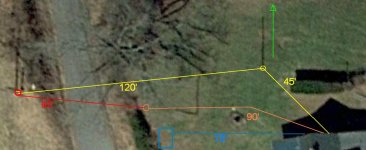Diggin It
Super Star Member
See, I'd actually be shortening the service drop run from what it is now. To get clear of a window on the house, they set a pole out in the yard 50' or so, then ran from the main pole to this new pole and to the house in a sort of triangle. If I can get them to do this change, the run will be a little shorter than it is now.
Yellow line is the current overhead service drop. Yellow circle is the pole they put in 20 years ago. Red circle is the main line pole. Red line would be the proposed overhead. Orange circle is where I want the pole and the orange line would be buried. Footages are estimated and fudged a bit, but close enough for this diagram.
Blue box is where I'm thinking for the propane tank and the blue line would be the new copper feed, also buried. The green arrow points downhill on the steepest slope I mow and this existing pole is somewhat in the way of turning the tractor where I need to.
Generator I'm thinking of is 12Kw and is small enough to set right beside the house at whatever required clearance.
But I have no idea what they might charge, if anything. I guess I'll find that out Monday. County says if they request a pole move for road work, this utility charges 3 grand or more which I ain't about to pay. But that's for a primary, not a service drop.

Yellow line is the current overhead service drop. Yellow circle is the pole they put in 20 years ago. Red circle is the main line pole. Red line would be the proposed overhead. Orange circle is where I want the pole and the orange line would be buried. Footages are estimated and fudged a bit, but close enough for this diagram.
Blue box is where I'm thinking for the propane tank and the blue line would be the new copper feed, also buried. The green arrow points downhill on the steepest slope I mow and this existing pole is somewhat in the way of turning the tractor where I need to.
Generator I'm thinking of is 12Kw and is small enough to set right beside the house at whatever required clearance.
But I have no idea what they might charge, if anything. I guess I'll find that out Monday. County says if they request a pole move for road work, this utility charges 3 grand or more which I ain't about to pay. But that's for a primary, not a service drop.

